Two recently released text-to-speech extensions can transform Firefox into a talking Web browser suitable for users with visual impairments — and anyone else who can use a speech interface to the Web. Fire Vox is designed to be a full-fledged "screen reader in a browser," usable for daily browsing even for unsighted users. CLiCk, Speak provides point-and-click screen reading, which can be helpful for partially-sighted users or sighted users who have written language difficulties (such as dyslexia).
Category Archives: news
Found this video on youtube where user criticizes MS Office’07 and recommending on switching to OOo, version 2.3 in this video. His words go on to say:
“I strongly advise you don’t get Microsoft Office 2007 – any of the editions – you ARE getting ripped off!!” and …. “And if you have a Mac, download NeoOffice, a better version of OpenOffice for Mac users:”
Intel Based Macs: http://gulus.usherbrooke.ca/pub/appl/…
Other based Macs: http://www.planamesa.net/neojava/down…
{ …. but why uninstalled it !!!}
To Download OpenOffice, go to: http://download.openoffice.org/
 This week in DistroWatch Weekly:
This week in DistroWatch Weekly:
- Reviews: A grand overview of popular desktop distributions
| Ubuntu | PCLinuxOS | openSUSE | Fedora | Mint | Sabayon | MEPIS | Freespire | |
| Ease of installation |  |
 |
 |
 |
 |
 |
 |
 |
| Ease of use |  |
 |
 |
 |
 |
 |
 |
 |
| Package management |  |
 |
 |
 |
 |
 |
 |
 |
| Speed |  |
 |
 |
 |
 |
 |
 |
 |
| Average | 8.75 | 8.5 | 7.75 | 6.5 | 9 | 6 | 7.25 | 8 |
- News: Ubuntu “Hardy Heron”, openSUSE Weekly News, Mandriva Flash and Linutop,
- Fedora release history, interview with Eric Sandall from Source Mage, Foresight 2.0 plans
- Released last week: CentOS 5.1, Damn Small Linux 4.1
- Upcoming releases: Frugalware Linux 0.8 Pre 1
- Donations: MEPIS receives US$300
- New additions: Vixta.org
- New distributions: Jazz Linux, Pendrive Linux, ZXMameCD
- Reader comments
Read more in this week’s issue of DistroWatch Weekly….
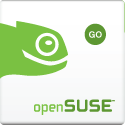

“Really the big basic difference is that Ubuntu is a simplified cookie cutter distribution designed to not overwhelm the new user with choice. openSUSE on the other hand is the polar opposite offering choices for every aspect of Linux computing. openSUSE is very scalable and it can be as easy or advanced as one needs. You could install openSUSE on a dozen machines and none be the same if that was your wish, whereas install Ubuntu on a dozen machines and it would be exactly alike except some might not be able to connect to the internet.”
“There really isn’t much of a comparison between these two distros as they are so vastly different in target audience, capabilities, and philosophies. If you are a brand new Linux user perhaps you should get your feet wet with Ubuntu as openSUSE might seem a bit overwhelming. After a coupla weeks and you begin to feel claustrophobic, then branch out to try openSUSE. If you have any Linux or advanced Windows experience, then you might prefer the functionality found in openSUSE.”
 Xfce 4.4.2 is now available. It’s the second maintenance release in the 4.4 stable series, focusing on fixing bugs and updating translations.
Xfce 4.4.2 is now available. It’s the second maintenance release in the 4.4 stable series, focusing on fixing bugs and updating translations.
Xfce 4.4.2 Changes include:
Window Manager (xfwm4):
Be more relax with transients, allow transients to be sticky independently of their parent window (Bug #3296).
Fix xfwm4 hanging with gtk+-2.11.x (Bug #3346).
Plug a leak in mouse button grab when changing theme.
Fix dialogs and modals without parents not being automatically centered like before (Bug #3278).
Fix modifier mask not working with all keymaps (Bug #3194).
Fix wrong count of key shortcuts causing switch to last workspace on modifier key press if no window is focused (Bug #3191).
Fix spec file missing from the tar ball causing ‘make dist’ to fail.
Fix strict bound checking causing wrong window to be focused in focus follow mouse (Bug #2781).
Transients for group shouldn’t apply to other transients, or it breaks stacking for some apps, noticeably mozilla “save as” dialog…
Fix typo breaking compilation on systems without XShape 1.1 support.
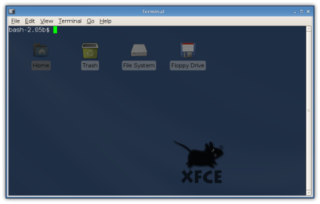
Full Changelog |  Downloads |  Full Annoucement
The first thing to address: Are these two devices truly competitors? The answer is yes – but only to consumers who don’t know what they REALLY want. You see – Both are extremely portable 800×480 Internet centric Linux devices in the $400-$470 street price range. However, both have clear cut advantages in certain areas that would only be of benefit to people who knew those advantages beforehand and used them as a basis for a purchasing decision.
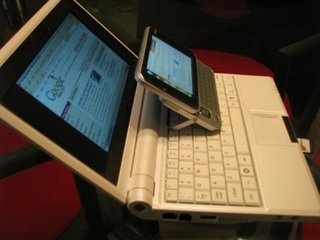
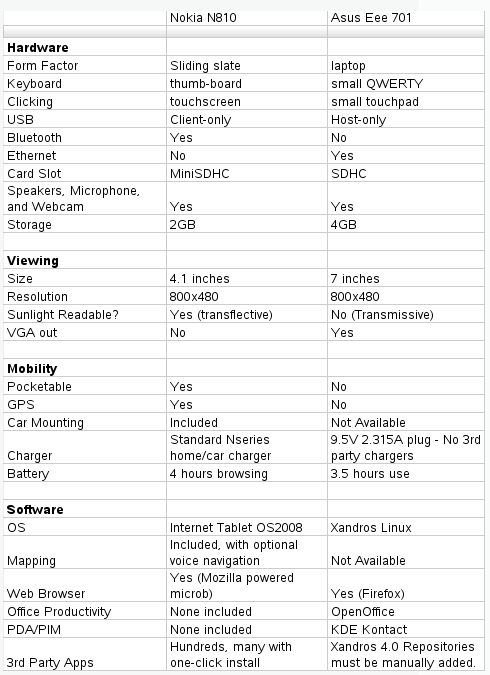
Latest nightly build of Firefox 3 sports the much improved location bar autocomplete, that unlike Firefox 2 which only looked for web addresses in my history, this one looks on visited and bookmarked page titles and tags along with web addresses.
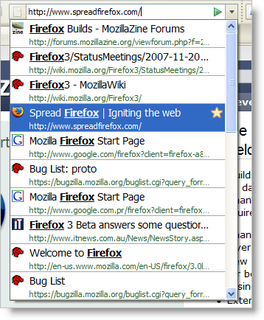
The autocomplete list now shows page titles and addresses in two different lines and colors. The top line has the website’s icon, title name and a star (if the site is bookmarked by you). The second line is much smaller and has the URL of the website. As you type the matching portions of the title and URL are highlighted and underlined so that you can easily tell what matches.
Personally, I really liked the multi-line approach to the Location Bar, and if I am not mistaken it is the first browser to have this (maybe Opera has it).
 The KDE Release Team has decided to release KDE 4.0 this coming January. The release was originally planned for mid-December. The KDE developers want to solve a couple of essential issues before releasing. Having solved some of those issues, among which were glitches in the visual appearance, and in Konqueror, the KDE community hopes to have a KDE 4.0 that will live up to the high expectations for it. Read on for more details.
The KDE Release Team has decided to release KDE 4.0 this coming January. The release was originally planned for mid-December. The KDE developers want to solve a couple of essential issues before releasing. Having solved some of those issues, among which were glitches in the visual appearance, and in Konqueror, the KDE community hopes to have a KDE 4.0 that will live up to the high expectations for it. Read on for more details.
Meanwhile, the progress towards KDE 4.0 is astonishing. Most parts, such as the KDE Development Platform and a lot of applications are considered stable and well-usable.
Some parts of the desktop experience do not yet meet the KDE community’s quality standards and expectations for a stable release. There are also some issues which need to be addressed upstream, for example a bug in certain codecs of xine that cut off audio fragments prematurely. The developers are confident to be able to release a more polished and better working KDE 4.0 desktop in January. The changed plans involve releasing on January 11th, 2008.
At the same time, the release team’s call for participation is repeated. To make KDE 4.0 a success, your effort is needed. An overview of current showstoppers can be found on Techbase, KDE’s knowledge platform.
This is also a call to the wider Free Software community, and also to companies working with KDE. If you have the resources to contribute, assistance in fixing the remaining bugs is most welcome. -dot.kde.news
Related: KDE 4: some reasons for design decisions (very interesting article, especially to those who wonder what will be the vital differences between KDE 3 and 4)
Also check out a page on TechBase to track the porting status of Qt/KDE applications, which are not part of the KDE 4.0 release, with the applications that distributions tend to have in their default installation as a start.
IPCop is a specialized Linux distribution whose sole purpose is to safeguard the computers and networks it is installed on. The distro proudly claims, "The Bad Packets Stop Here!" I recently installed IPCop 1.4.16 on my SOHO LAN, and found that it accomplishes what it sets out to do.
Even if you work only in Linux, you’ll likely have to use Microsoft Compiled HTML Help (CHM) files at one time or another. Several open source projects use this common format, including Apache, MySQL, PostgreSQL, Python, and PHP.
